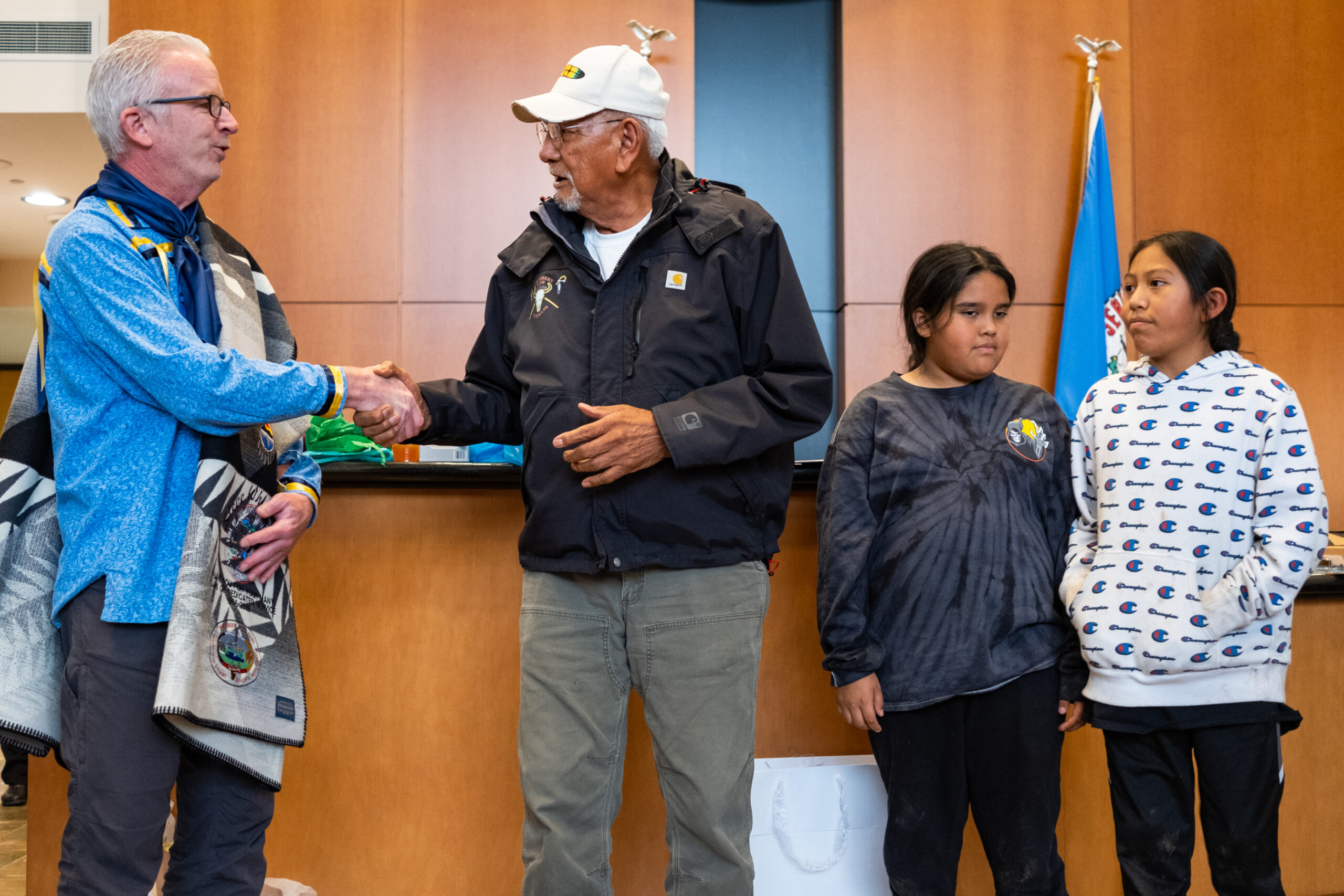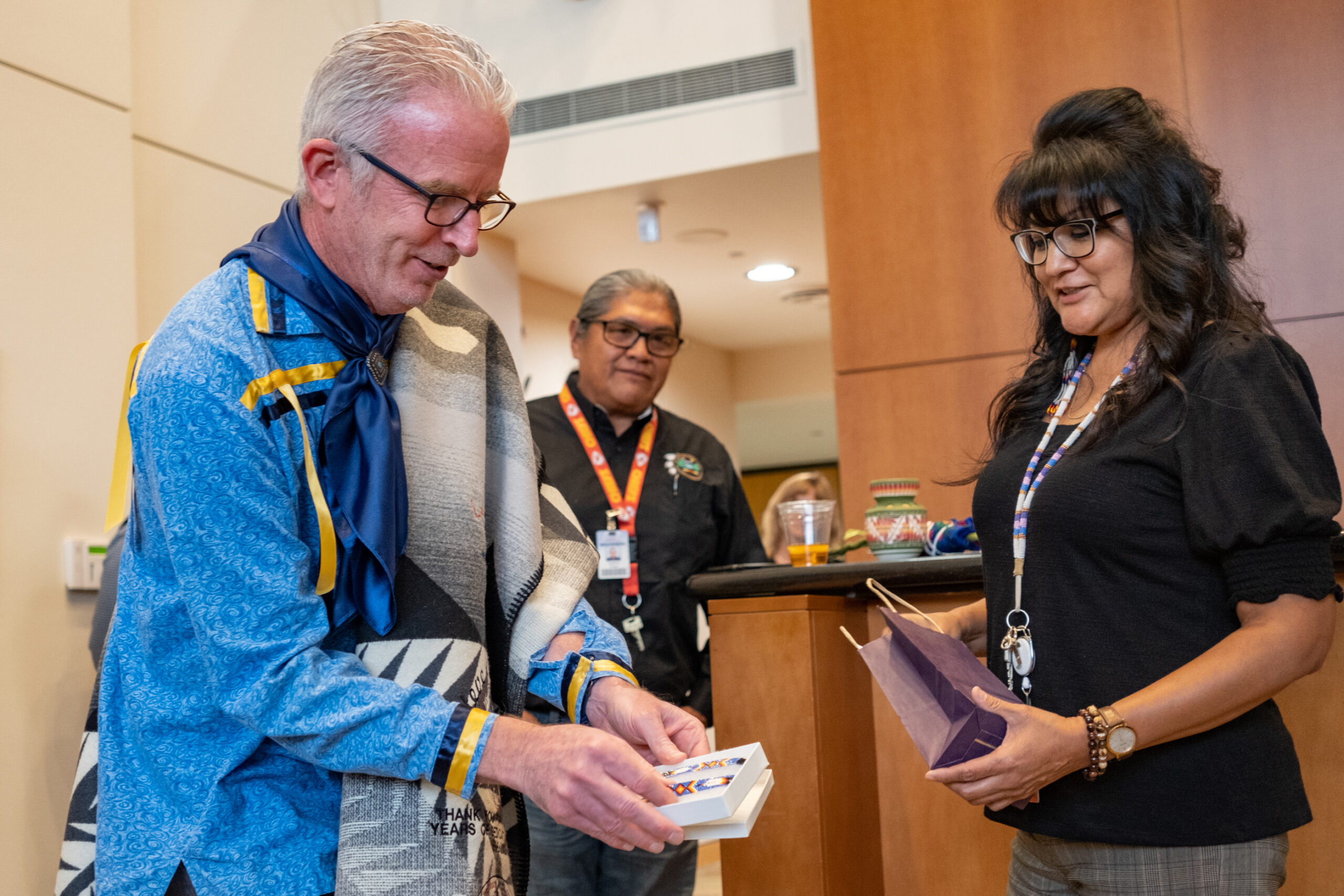Tribe bids farewell to longtime employee, wildlife advocate
The Southern Ute Indian Tribe held a farewell reception for long time Wildlife Division Head, Steve Whiteman, Wednesday, Oct. 8 in the Hall of Warriors, resigning from his position with the Wildlife Division after 26 plus years of service with the Division of Natural Resources. Whiteman accepted a biologist position with the U.S. Fish & Wildlife Service out of Sacramento, Calif., in order to be closer to family. The farewell reception was attended by many of Whiteman’s longtime colleges, friends, and family.
“Working for the Tribe was a privilege that I’ll always be thankful for,” Southern Ute Wildlife Division Head, Steve Whiteman said. “I felt like I was part of something unique and special; helping to uphold the Tribe’s sovereign ability to manage and protect its wildlife resources for the benefit of the people. I don’t think I would have gotten that experience working for a state or federal wildlife agency.”
“I think the cultural connection between the people and the land and wildlife made the work very special, too,” he emphasized. “The Utes have a very strong history and tradition with subsistence hunting. Ensuring that the resources are managed well and protected is very important to keeping this tradition alive.”
“Steve was always a consummate professional in his role with the Tribe,” Aran Johnson said. “He knew who he worked for and never strayed from getting the best result for the Southern Ute people in whatever project he was working on. Under Steve’s leadership the Wildlife Division excelled in all its programs and is recognized today as a top wildlife agency in Indian Country.” Johnson was recently hired as the Division Head for Wildlife, taking over Whiteman’s responsibilities for the Tribe.
In California, Whiteman will be joining the fight to restore salmon and other fish and wildlife impacted by federal water projects, climate change, and a myriad of other threats in his new role with U.S. Fish & Wildlife. “This is no small task, to be sure, but I’m excited about the challenge and hope to make a real difference,” he said.
Steve Whiteman originally hails from Walnut Creek, Calif., he graduated from University of California, Davis with a Bachelor of Science degree in Fish and Wildlife Biology prior to accepting a position for Southern Ute Natural Resources in 1996 — fresh out of college. Whiteman came on as the Fisheries Biologist, then five years later he moved to the position of Wildlife Division Head, replacing Terry Stroh. Whiteman worked in that capacity over the past two decades — until the departure of the DNR Director in 2020, at which point he assumed the responsibilities of acting DNR Director until Andrew Frost was hired for that role in March of 2021.
“Steve was an amazing boss and mentor to our crew,” Wildlife Division Administrative Assistant, Nicole Black said. “I wholeheartedly know how much he loved working for the Tribe and advocating for the tribal membership’s sovereignty. He will be dearly missed.”
Steve Whiteman’s notable accomplishments include being part of the Animas LaPlata Project Task Force, working with the State of Colorado Wolf Reintroduction program on Tribal sovereignty and protection of tribal resources, implementation of the Lake Nighthorse Kokanee Salmon give-away, treasurer for the Southwest Tribal Fisheries Commission, advocate for sister tribes hunting opportunities through Special hunt requests, and the cultivation of the Tribe’s Bison Program which provides meat to the membership.
Whiteman was very proud to be a part of the 2008 agreement with the State of Colorado for the Utes to resume exercise of their reserved Brunot hunting rights in the San Juan Mountains.
The “Brunot Agreement” was an agreement between the Ute people and the U.S Government, dating back to 1873 — and according to the Tribe’s website, the agreement represented a major loss to the reservation land base and was yet another blow to the Utes’ traditional hunting-and-gathering way of life.
As stated in the Southern Ute Tribe’s Brunot Area Hunting & Fishing Proclamation, “in 2008, the Southern Ute Indian Tribe entered a new agreement, this time with the State of Colorado, addressing the Tribe’s exercise of its long-held Brunot Area hunting and fishing rights. This agreement – or Memorandum of Understanding (MOU) – details how the Tribe and State approach Brunot Area hunting, fishing, and wildlife law enforcement, and expresses the intent of both governments to work cooperatively toward long-term conservation of wildlife within the Brunot Area. With the completion of the MOU, tribal members are once again able to exercise the Tribe’s long-held rights to hunt and fish within the Brunot Area, in accordance with regulations established by the Tribe.”
Steve Whiteman, Sam Maynes at Maynes Bradford Shipps & Sheftel, and the Tribe’s Legal Department, among others, were all instrumental in seeing the Brunot Area Hunting & Fishing Proclamation come to fruition on behalf of the tribal membership.
“It has also been an honor to help manage the Tribe’s bison herd for the membership’s cultural and nutritional benefit, to improve the membership’s access to eagle feathers for spiritual and religious uses, to help support the cultural hunting needs of other tribal nations, and many other great accomplishments,” Whiteman said.
“All of this can be attributed to the strong vision and support of Tribal leaders over decades, and the dedicated efforts of a team of professional staff at the Tribe,” Whiteman emphasized. “I am extremely grateful to have had this opportunity and to have been welcomed into the Tribal community. I will always cherish the time I was able to work for the Tribe and look forward to seeing the Tribe’s continued progress — Tuvuchi tog’oiak’ Núchiú.”




